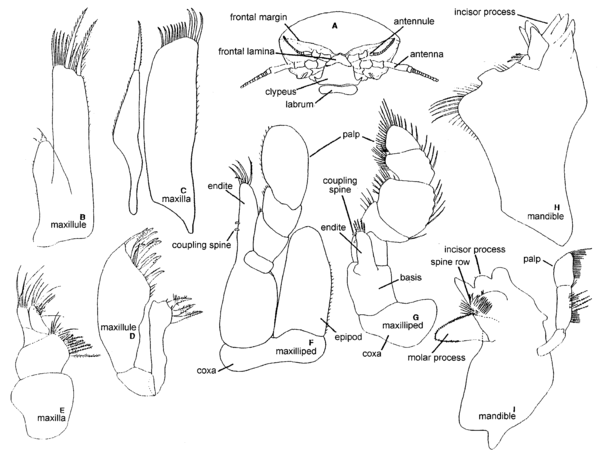(Syn. incisor process) [Butler, T.H.].
A medial process of the mandible. In the plesiomorphic condition, it has a broad, distal, triturating surface with circumgnathal denticles, a posterior row of broad, setulate setae, and sensory pores on the distal surface [Wilson, 1989].
Grinding portion of gnathal lobe of mandible. (Syn. pars molaris) [Moore and McCormick, 1969].
Grinding portion of gnathal lobe of mandible. (Syn. pars molaris) [McLaughlin, 1980].
Inwardly directed process of mandible usually bearing spines or a flat grinding surface [Holdich and Jones, 1983].
(Order Diplostraca):
Terminal end of each mandible; extends into preoral cavity (atrium oris) under upper lip (labrum) [Stachowitsch, 1992].
(Class Cephalocarida):
Grinding process (vs. gripping = incisor process) at end of each mandible. Bears numerous small teeth and extends into atrium oris under labrum [Stachowitsch, 1992].
(Order Cumacea):
Proximal grinding process (vs. gripping = incisor process) of each mandible. (columnar = cylindrical = truncate, styliform). (Syn. pars molaris) [Stachowitsch, 1992].
(Order Tanaidacea):
Proximal grinding process (vs. gripping = incisor process) of each mandible [Stachowitsch, 1992].
(Order Decapoda):
Grinding process (vs. gripping = incisor process) of each mandible. May be fused with incisor process. (Syn. pars molaris) [Stachowitsch, 1992].
(Order Amphipoda):
Proximal grinding process (vs. gripping = incisor process) of each mandible. (laminar, ridged, rounded, setulose, smoothly truncated, absent) [Stachowitsch, 1992].
(Order Isopoda):
Grinding, or piercing or slicing structure, arising mid-basally on body of mandible; pars molaris [Wetzer et al. 1997].
( )
)
 )
)Nomenclature of isopod cephalon (A). Examples of isopod mouth appendages: Idoteidae (B, C, F, H); Cirolanidae (D, E, G, I). [Wetzer et al. 1997]
(Order Isopoda):
Proximal grinding process (vs. gripping = incisor process) of mandible. (immovable, movably articulated; blade-like, blunt-pointed, broad and truncate, pointed with apical setae, spiniform, truncate with teeth) [Stachowitsch, 1992].
(Order Mysida):
Proximal grinding process (vs. gripping = incisor process) of each mandible [Stachowitsch, 1992].
(Order Stomatopoda):
Well-developed grinding process (vs. gripping = incisor process) of each mandible. Armed with two rows of teeth and extends beneath labrum into mouth. (Syn. pars molaris) [Stachowitsch, 1992].
(Order Leptostraca):
Grinding process (vs. gripping = incisor process) of each mandible [Stachowitsch, 1992].
(Class Remipedia):
Grinding process (vs. cutting = incisor process) at tip of each mandible; located on pedestal and composed of broad, flat basin containing dense rows of spines [Stachowitsch, 1992].
(Superorder Syncarida):
Proximal grinding process (vs. distal gripping = incisor process) of each mandible [Stachowitsch, 1992].
(Order Thermosbaenacea):
Proximal grinding process (vs. gripping = incisor process) of each mandible. Bears series of fine setae (guide setules) [Stachowitsch, 1992].
(Order Euphausiacea):
Grinding process (vs. gripping = incisor process) of each mandible [Stachowitsch, 1992].
Crustacea glossary. Natural History Museum of Los Angeles County. 2011.